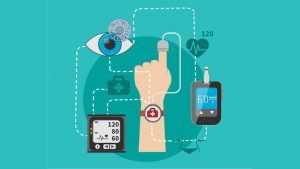Digital health has the potential to profoundly enrich healthcare services – but thus far, it hasn’t been much of a priority for investors.
If anything constructive has developed as a result of the coronavirus pandemic, it’s that we’ve been presented with an opportunity to reevaluate how we think about healthcare, from telemedicine to research and data to collaboration.
As former British prime minister Winston Churchill so aptly put it: “Never let a good crisis go to waste.”
That being said, here are some of the top e-health trends that are expected to loom large in 2021:
The Expansion of Telemedicine
Telemedicine – the practice of patients consulting clinicians virtually instead of in brick-and-mortar offices and hospitals – has escalated significantly during the pandemic as populations across the globe have scaled back on in-person encounters. This approach has proven that remote consultations are not only achievable, but also effortless and – in many instances – more desirable.
Some experts believe that this is just the beginning, and that soon the scope of telemedicine will broaden.
The trend is anticipated to extend beyond the clinicians and physicians at primary care clinics to encompass specialty care as well.
In addition to remote consultations, experts say that they’re already observing expanded use of home medical devices, such as remote monitoring of cancer patients.
Virtual Reality in the Healthcare Market
The digital health virtual reality (VR) market is expected to increase to $2.4 billion globally by 2026, largely by virtue of its capacity to eliminate the need for particular medications or surgeries.
VR technology is presently being used to treat chronic pain, anxiety, and post-traumatic stress disorder, all with a considerable degree of success.
National Digital Health Portals – And the Big Data That Comes with Them
Worldwide, nations are working to develop more in-depth and accessible electronic health records.
In Sweden, for example, all citizens and residents are assigned a personal identification number, referred to as the Swedish PIN, that’s used for all of their healthcare documentation. Researchers who are privy to these digital health portals can revel in a wellspring of data.
Generally speaking, there are a number of distinct advantages to being able to access a cohesive system of patient records, including a reduced occurrence of medication errors, facilitating preventive care, and more accurate staffing levels.
The Power of AI and Digital Health
Artificial intelligence (AI) will play a huge part in the digital transformation of healthcare. As a matter of fact, the AI healthcare care market is projected to surpass $34 billion by 2025.
At present, many patients have likely engaged with or at least become aware of some form of AI, such as the PARO robotic seal for dementia patients or chatbots that provide services ranging from customer service to therapy.
But the future of AI lies in precision medicine, genomics, drug discovery, and medical imaging. Take cancer treatments, for instance. By using AI’s pattern-recognition capabilities, physicians can prescribe personalized treatment customized to a patient’s genetic make up and lifestyle.
Furthermore, pharmaceutical and biotech organizations employ machine learning algorithms to shorten the drug development cycle. Just recently, researchers in the U.S. devised AI technology that can correctly identify and diagnose COVID-19 – even in asymptomatic patients – just by the sound of a cough!
All in all, global AI in the healthcare diagnosis market was valued at nearly $3.7 billion in 2019 and is expected to reach nearly $67 billion by 2027! Predictably, startups around the globe are already jumping at the chance to design the next groundbreaking piece of healthcare technology.
Transnational Digital Health Collaboration
The pandemic has demonstrated that countries are grappling with similar healthcare challenges, not only in response to the coronavirus, but also in the context of providing top-notch, effectual care to people in need.
The nations of the world must strive to understand that we are all in this together. We are reliant on each other. We can (and must) facilitate data exchange in order to better identify which countries are experiencing problems at the present time. It’s also crucial for nations to band together to combat cybersecurity issues which have become pervasive in recent years.
Apps, Wearables, and Self-Monitoring Solutions
Healthcare providers are expediting solutions for self-monitoring for patients with chronic diseases. This carries with it the potential for significant cost savings, as the management and treatment of chronic illnesses make up approximately 80% of the total cost of healthcare.
Self-monitoring programs come in a variety of forms, but one that’s enjoying encouraging outcomes is wearable devices – a market that’s expected to eclipse more than $27 million by 2023, up from just $8 million in 2017.
From heart-rate sensors and exercise trackers to sweat meters that help diabetics monitor their blood-sugar levels and oximeters that monitor the level of oxygen in the blood for respiratory patients, the wearable market is galvanizing patients to assume responsibility for their own healthcare.
Digital Health Hubs and Startup Ecosystems
Innovation and growth occur much quicker in areas where you have a critical mass and access to key players, everyone from investors to partners. Digital health hubs offer the opportunity to form relationships and develop connections.
In many countries, there’s no officially recognized process for how to purchase, implement, and assess digital health technologies on a wider scale. The true experts in this respect are startups that manage to effectively maneuver the systems and execute digital solutions successfully.
Conclusion
If ever there were a time to invest in digital health, it’s now. By utilizing technology to collaborate with other pioneers and enhancing the products and services in the digital healthcare space, the lives of millions of people can be improved. Don’t get left behind!
********************
EncounterWorks is a completely integrated system that combines data management, billing, and EHR functions into one easy, smart, and flexible platform. Our EHR (Electronic Health Record) offers so many advantages over traditional systems because of its unique, easy-to-use design. Our advanced technology enables us to provide more features, increased security, and better interoperability at a much lower overall cost – so you can focus on running your practice rather than dealing with technology pains. Simply put, we let you focus on patient care.
Want to know if EncounterWorks EHR is right for your organization? Sign up for a quick demonstration of EncounterWorks today! This 30-minute demo will visually show you how our EHR could function for your specific practice. For more information, give us a call at 877.884.3367 today!













